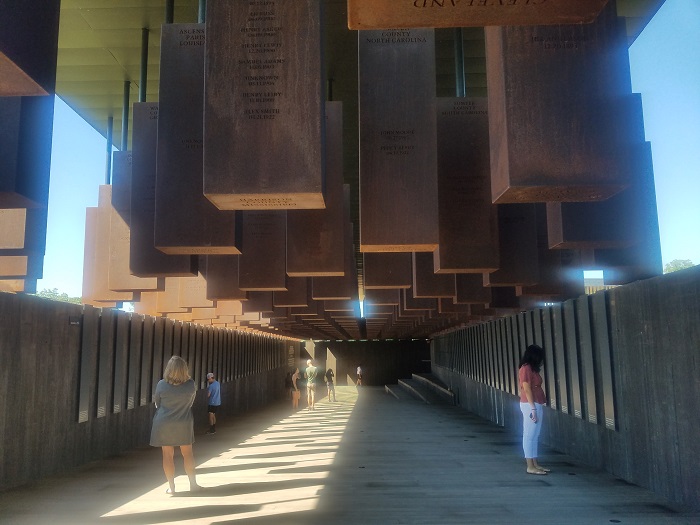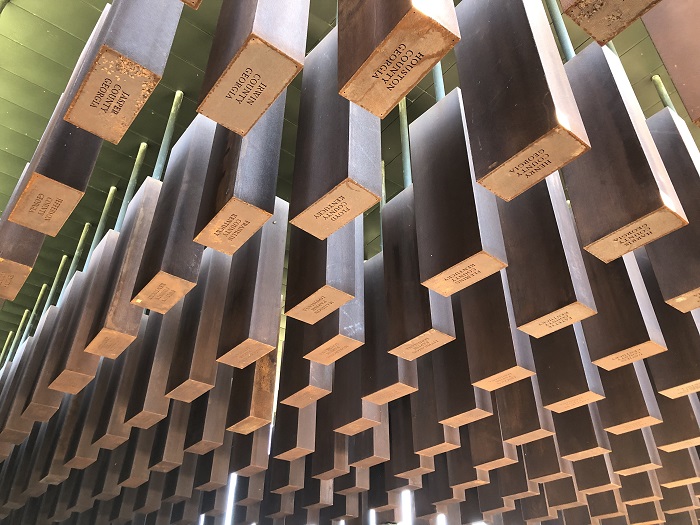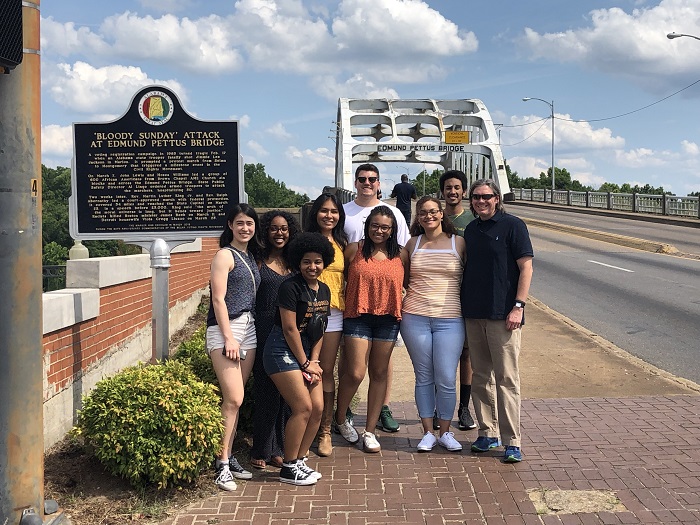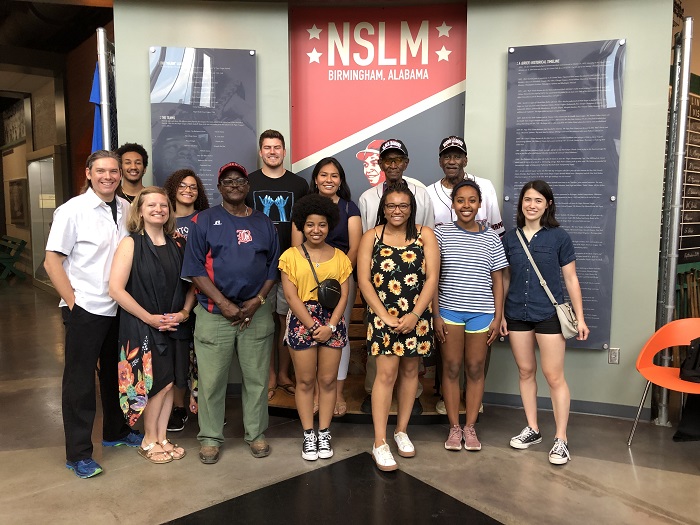‘Honestly Remembering Together’: Study Away course takes students to heart of Civil Rights movement

Visiting Assistant Professor of Government Jackson Sasser and eight William & 玛丽 students quietly passed through the National Memorial for Peace and Justice, gazing upward at names and places as they reflected upon acts of racial terror and their modern-day reverberations.
They walked beneath tombstones of sorts, burnt red steel plinths that carried even more weight than their coffin-sized frame would suggest. Each monument was inscribed with the name of a U.S. county in which at least one racial terror lynching took place between the end of the Civil War and the beginning of WWII.
There are more than 800 monuments total, representing more than 4,300 African American victims. Those are just the lynchings that are documented.
The visit to the National Memorial for Peace and Justice was a pillar of Sasser’s COLL 300 Study Away course this summer, with its one week ‘away’ segment taking place in the heart of the civil rights movement: Montgomery and Birmingham, Alabama. Titled “Honestly Remembering Together,” the course encouraged students to draw connections between the legacy of extra-legal violence (like racial terror lynchings) in the United States and modern-day capital punishment.
“I’ve never been a part of anything quite like this,” Sasser said. “I think it’s probably the most important thing I’ve done professionally. Our students — and the women and men who were kind enough to visit with us — were extraordinarily moving.” The trip was just as moving for Sasser’s students. While the course explored subject matter that was painful and disturbing, the trip provided them with high-impact learning experiences that shaped their understanding of society.
The trip was just as moving for Sasser’s students. While the course explored subject matter that was painful and disturbing, the trip provided them with high-impact learning experiences that shaped their understanding of society.
“It was easily a highlight of my college career,” Micaela Wibberly ’21 said. “I initially expected it to be a really disheartening experience, knowing that our trip was focused around the lynching memorial and the inequalities that continue to exist in our country. But I think what I got out of the experience was a message of hope. We learned a lot about the history of the civil rights movement. We also met with people who are pursuing equal justice and racial reconciliation in the present day.”
Study Away
Sasser said the idea for the course came after speaking to the 1693 Scholars program. Sasser spoke about two of his seminars – “Race, Law, and Memory” and “Death is Different,” a capstone course on modern capital punishment – which consider the kinship between the modern criminal justice system and the Jim Crow South.
1693 Director Dan Cristol, who is also the Faculty Director of Undergraduate Research with the Charles Center, suggested Sasser meet with Director of Study Away Chelsie Craddock to brainstorm logistics and develop a program proposal. Sasser then created a course syllabus, a daily travel itinerary and expected expenses for the trip.
作为
Bearing witness
 With his syllabus in place, Sasser assigned readings to get the students up to speed on the subject matter. Selections included a transcript of Dr. Martin Luther King, Jr.’s December 1955 speech at Holt Street Baptist Church in Montgomery, memoirs from activists of the Montgomery Bus Boycotts, a recent Department of Justice report on the conditions inside Alabama prisons, and local news articles about the history of slavery in Hampton Roads.
With his syllabus in place, Sasser assigned readings to get the students up to speed on the subject matter. Selections included a transcript of Dr. Martin Luther King, Jr.’s December 1955 speech at Holt Street Baptist Church in Montgomery, memoirs from activists of the Montgomery Bus Boycotts, a recent Department of Justice report on the conditions inside Alabama prisons, and local news articles about the history of slavery in Hampton Roads.
While in Alabama, Sasser and his students toured civil rights landmarks, like the Freedom Riders Museum, the Birmingham Civil Rights Institute, and the Edmund Pettus Bridge in Selma. They also met with several experts and practitioners who are carrying on the legacy of the Civil Rights Movement and working for equality to the current day. Sasser said those discussions were “the heart of the course and the heart of the trip.”
One of the many speakers that stood out to the students was Aylia McKee, Chief Public Defender in Montgomery County.
“One of the first things McKee said to us was that the American criminal justice system ‘Isn't the best, but it's the best we got.’ She plainly described instances in which discrimination and stereotyping occurred in past cases,” Aleyah Gowell ’20 said. “It was unnerving to learn of these injustices, but it was more so reassuring to meet so many enthusiastic young attorneys who are dedicated to advocating for their clients and combating these wrongful assumptions.”

Th
“Honestly Remembering Together”
 What’s in a name?
What’s in a name?
“It means that the present is deeply rooted in the past,” Wibberly said. “A lot of the inequalities we face today can be traced directly back to the legacy of slavery—we can’t address our current problems without also recognizing the role our history played in creating them.”
Sasser said he made sure ‘Together’ was not just a word in the course title, but a theme of the trip. He wanted the group to bond over their shared experience. Each night, after their scheduled events were complete, Sasser would ask his students if they would “like to be a family tonight.”
They always said yes, and spent their nights bowling or watching movies together. They even went to a minor league baseball game on Father’s Day to honor the trip’s ‘Dad,’ baseball and Atlanta Braves fan Professor Sasser.
“They were also just a blast to be around,” Wibberly said about the group. “I really loved that, while we took the subject matter of this trip seriously, we were still able to have fun in our downtime. I'm glad we are already making efforts to stay in touch.”
















